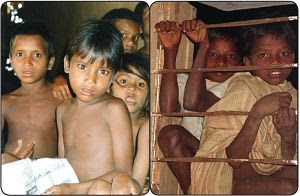Peoples Aid is an Organisation based across several countries,including New Zealand, that focuses on giving people in poverty the opportunity and resources to engage in meaningful work occupations.This is an area that is very relevant to Occupational Therapists as it enables people to engage in occupations which will bring them out of poverty and occupational deprivation.
“If you give a man a fish, he will eat it today and be hungry tomorrow, but if you teach a man to fish then he will not only eat today, but also tomorrow and so on.”
Rickshaws For India is a program that busts the shackles of poverty that keep poor Indian families bound, and gives them the means to self-sufficiency and dignity. A Rickshaw provides a poor Indian family with a debt free business, enabling them to permanently earn a good income and be self supporting.
In India, Rickshaws are a major mode of taxi transportation for people taking short journeys. Those going to and from work and school, shoppers and business people all ride on Rickshaws. They are also used for moving goods and courier jobs. The government promotes their use as they are non-polluting.
Therefore, having a Rickshaw enables an Indian family to have a debt free, good income producing small business that permanently supports them. This provides food, housing, clothing, healthcare, and a proper education for their children.These families are just so grateful for their new Rickshaws and the better life they provide. Things that we take for granted they are now able to obtain. When being given their new Rickshaws many cry with joy. Hope floods into their lives as they are liberated.
For most of them it is the first time in their lives that they can eat every day. They can choose to live in a community with clean water and sanitation instead of in the squalid, disease-ridden slums. Rather than the children being forced to work in dangerous sweat shops, they can go to school. They are able to afford adequate clothing and buy necessities like soap and toothbrushes. For once they have the possibility of saving some money rather than merely surviving day to day.
Side Note: Children Forced Into Slave Labor
The hard-earned money that the driver is forced to hand over to the Rickshaw landlord could make a tremendous difference to the Rickshaw driver’s family, especially the children. Because their income is so substandard, they are forced to live in slums where disease runs rife. Children are not able to be educated and basic medicines are beyond their means. In India there is no social security or sickness benefits. Sadly, to make up the difference between starvation and subsistence, the children are often sent off to work. The jobs that are available to children are unimaginably horrible to Westerners. Tiny boys and girls frequently do hard labor at many dangerous slave jobs, such as digging drains, working in sweat factories, carrying heavy loads, even removing needles from used and likely contaminated syringes. Poverty is a curse for everyone in its oppressive grip, but how much more it is for the children.
The Sewing Machines For India program enables women to attend a comprehensive 3 or 6 month training course. We provide all of the materials necessary during the course. We also give assistance to enable the women to support themselves and their families during the course. They are given the same top quality model of Sewing Machine that they learn on. After being properly trained, owning a debt free Sewing Business enables the recipient to earn a good income that permanently supports them.
These Rickshaws and Sewing program are sponsered by people and churches from a number of countires. To find out more, please visit http://www.peopleaid.org/home_2.html











